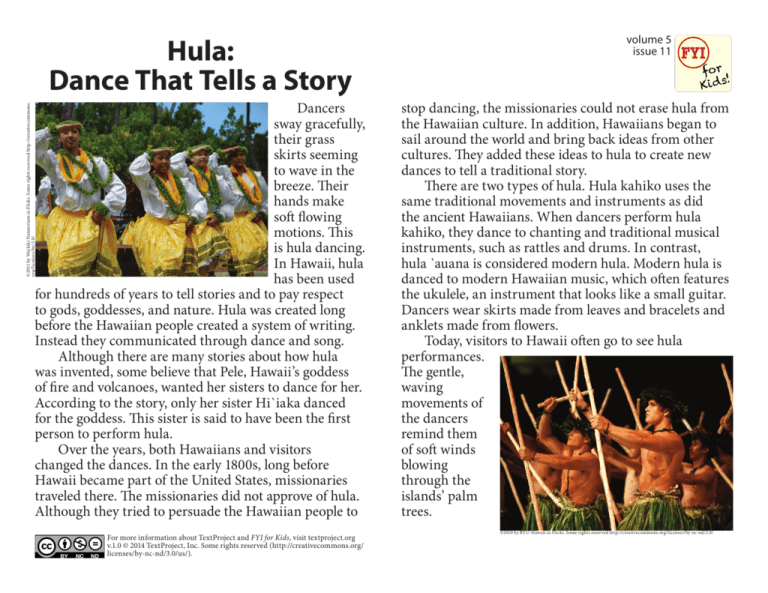
Hula:
Dance That Tells a Story
©2011 by Waikiki Natatorium in Flickr. Some rights reserved http://creativecommons.
org/licenses/by/2.0/
Dancers
sway gracefully,
their grass
skirts seeming
to wave in the
breeze. Their
hands make
soft flowing
motions. This
is hula dancing.
In Hawaii, hula
has been used
for hundreds of years to tell stories and to pay respect
to gods, goddesses, and nature. Hula was created long
before the Hawaiian people created a system of writing.
Instead they communicated through dance and song.
Although there are many stories about how hula
was invented, some believe that Pele, Hawaii’s goddess
of fire and volcanoes, wanted her sisters to dance for her.
According to the story, only her sister Hi`iaka danced
for the goddess. This sister is said to have been the first
person to perform hula.
Over the years, both Hawaiians and visitors
changed the dances. In the early 1800s, long before
Hawaii became part of the United States, missionaries
traveled there. The missionaries did not approve of hula.
Although they tried to persuade the Hawaiian people to
For more information about TextProject and FYI for Kids, visit textproject.org
v.1.0 © 2014 TextProject, Inc. Some rights reserved (http://creativecommons.org/
licenses/by-nc-nd/3.0/us/).
volume 5
issue 11
stop dancing, the missionaries could not erase hula from
the Hawaiian culture. In addition, Hawaiians began to
sail around the world and bring back ideas from other
cultures. They added these ideas to hula to create new
dances to tell a traditional story.
There are two types of hula. Hula kahiko uses the
same traditional movements and instruments as did
the ancient Hawaiians. When dancers perform hula
kahiko, they dance to chanting and traditional musical
instruments, such as rattles and drums. In contrast,
hula `auana is considered modern hula. Modern hula is
danced to modern Hawaiian music, which often features
the ukulele, an instrument that looks like a small guitar.
Dancers wear skirts made from leaves and bracelets and
anklets made from flowers.
Today, visitors to Hawaii often go to see hula
performances.
The gentle,
waving
movements of
the dancers
remind them
of soft winds
blowing
through the
islands’ palm
trees.
©2010 by BYU-Hawaii in Flickr. Some rights reserved http://creativecommons.org/licenses/by-nc-nd/2.0/





